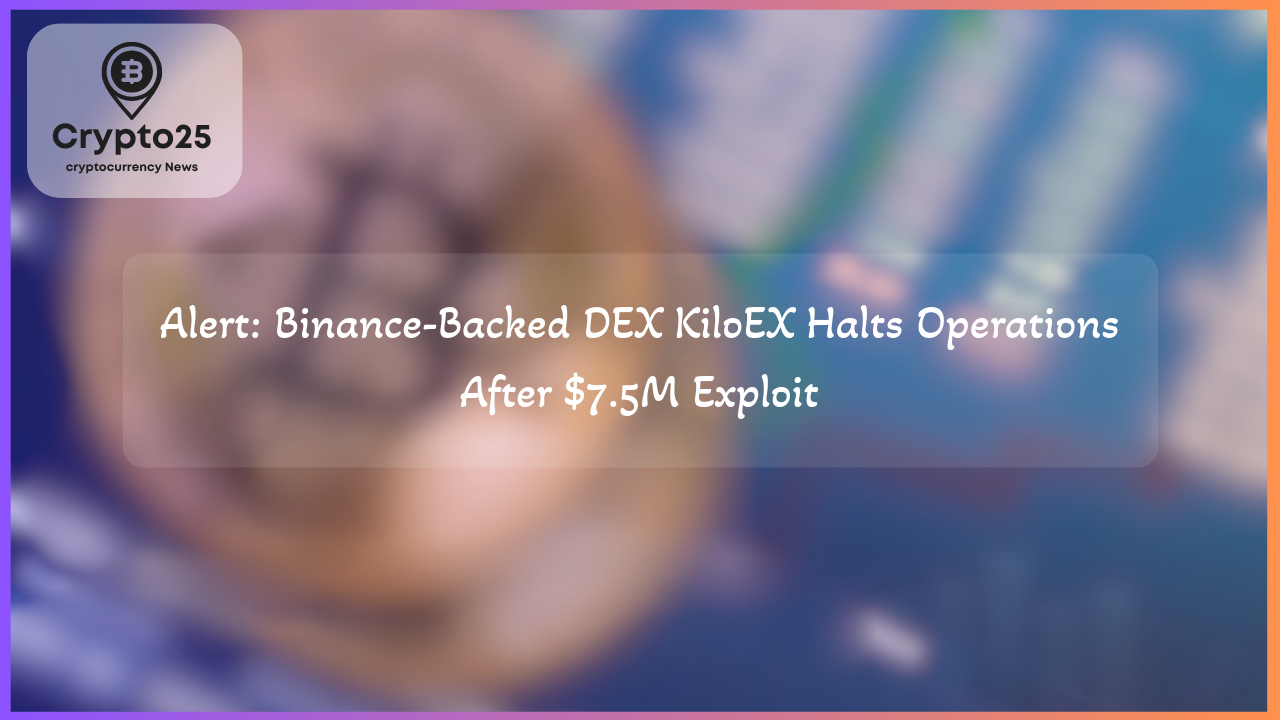
The Decentralized Finance (DeFi) space faced another daunting challenge as KiloEX, a decentralized exchange (DEX), suffered a hacking incident that led to a $7.5 million loss. The attack, identified as a price oracle exploit, forced the platform to suspend operations as it works with cybersecurity teams to track stolen funds and implement safeguards. This breach highlights the ongoing vulnerabilities within decentralized platforms.
## Understanding the KiloEX Attack: A $7.5 Million Price Oracle Exploit
KiloEX, a promising DEX launched in 2023 on the BNB Chain, opBNB, and Manta Network, was targeted in a well-coordinated price oracle exploit. Cybersecurity experts revealed that the exploit was designed to manipulate the platform’s price oracle system, a critical tool providing real-time asset pricing to the blockchain’s decentralized ecosystem. The manipulation allowed attackers to siphon off vast sums in cryptocurrencies, including $3.3 million from Base tokens, $3.1 million in opBNB, and $1 million from the Binance Smart Chain.
Price oracle exploits occur when attackers manipulate or corrupt external data feeds that provide market information to smart contracts on DeFi networks. This manipulation distorts the valuation of digital assets, creating opportunities for hackers to execute fraudulent trades or withdrawals at inflated or deflated prices.
## How KiloEX Plans to Respond to the Security Incident
In response to the breach, KiloEX released a public statement addressing its community, confirming the containment of the exploit and promising a detailed post-mortem report. The DEX has also introduced a bounty program, aiming to collaborate with ethical hackers and security researchers in tracking the attack’s mechanics and identifying vulnerabilities within its infrastructure. Moreover, KiloEX has provided the attacker’s wallet address—0x00fac92881556a90fdb19eae9f23640b95b4bcbd—to warn its partners and users, urging them to block interactions with the compromised wallet.
Highlighting a broader commitment to recovery, KiloEX offered the hackers a controversial proposal: return 90% of the stolen assets to avoid legal action or reporting to authorities. This approach has been utilized in previous cases of DeFi-related exploits, often resulting in partial recoveries and fostering discussions about how platforms address security breaches.
The incident also underscores the importance of third-party audits and robust risk management strategies in a space where decentralized operations make it harder to centralize accountability.
## Price Oracle Exploits: The Repeated Threat to DeFi Ecosystems
Price oracle vulnerabilities have consistently plagued decentralized finance. By serving as a bridge between blockchain systems and real-world asset data, price oracles are critical mechanics driving DeFi smart contracts. When misused, they can wreak havoc on entire ecosystems. Cases like the 2022 Mango Markets hack, which led to a $114 million loss due to oracle manipulation, showcase how critical this technology is to ensuring DeFi’s sustainability. Similarly, Venus Protocol lost $100 million in May 2022 following an oracle-based exploit, further cementing the urgent call for resilient oracle systems.
In the case of KiloEX, experts from PeckShield and Cyvers suggest that the attackers used Tornado Cash, a decentralized cryptocurrency mixer widely associated with illegal crypto activities, to obscure transaction trails. Such methods add complexity to investigative efforts while simultaneously pushing platforms to craft stricter defensive measures to protect users’ assets.
| Title | Details |
|---|---|
| Market Cap | $1.2 Trillion |
| KiloEX Hack Loss | $7.5 Million |
| Base Tokens Affected | $3.3 Million |
| opBNB Tokens Affected | $3.1 Million |
| Binance Smart Chain Tokens Affected | $1 Million |
## Strengthening DeFi Security: Lessons from KiloEX’s Case
The KiloEX incident serves as a stark reminder that despite the promise of decentralization, vulnerabilities continue to linger in the Web3 ecosystem. To mitigate these risks, platforms must implement diversified oracle systems, robust on-chain/off-chain security measures, and regular audits. Encouraging bug bounty programs can create an incentive for ethical hackers to identify weaknesses before they are exploited by malicious actors.
Additionally, KiloEX’s approach to engage with the hackers through negotiations and public disclosures reflects a nuanced trend among DeFi platforms. Whether this strategy will yield results remains to be seen, but it places a spotlight on the critical need to balance proactive security with reactive measures.
As the DeFi sector grows, the industry must prioritize trust and resilience. By investing in innovative security solutions, platforms can foster confidence among users and stakeholders while navigating the ever-evolving challenges of decentralization.
